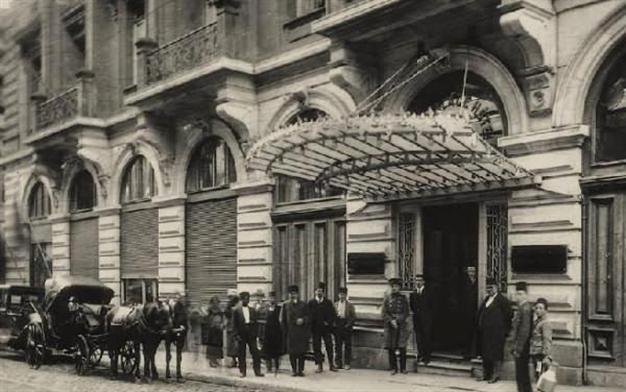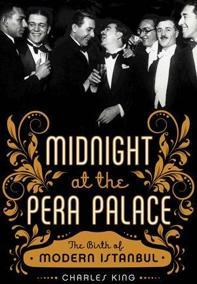The Pera Palace and the birth of modern Istanbul
William Armstrong - william.armstrong@hdn.com.tr
 ‘Midnight at the Pera Palace: The Birth of Modern Istanbul’ by Charles King (W.W. Norton, 476 pages, $28)
‘Midnight at the Pera Palace: The Birth of Modern Istanbul’ by Charles King (W.W. Norton, 476 pages, $28)As a crucible of Turkey’s modern age, Istanbul was deliberately passed over in favor of Ankara, the capital of the new Turkish Republic declared in 1923. Radio broadcasting, cultural institutions, the most powerful newspapers, and foreign embassies all decamped to the new capital, which went from being a dusty Anatolian backwater to the center of the attempted top-down cultural revolution. That revolution was seen as everything cosmopolitan Istanbul was not: Anti-imperial, past-negating, forward-looking. While the enduring sense of loss gave writers like Ahmet Hamdi Tanpınar and Orhan Pamuk a rich literary plow to furrow, the old Ottoman capital contended for years with a feeling of abandonment and decay.
 However, as historian Charles King reveals in this very enjoyable book, Istanbul also provides a useful prism to explore Turkey’s modern era. King centers his narrative on the Pera Palace, the hotel in the heart of the city’s European side opened in 1892. Initiated by the Wagon-Lits company, which was also behind the Orient Express, the hotel was intended to link to a chain of similar high-end establishments across the rest of the line. The Pera Palace captured the spirit of the age - as intellectual and cultural tastes among the Ottoman elites turned toward Europe and economic ties deepened.
However, as historian Charles King reveals in this very enjoyable book, Istanbul also provides a useful prism to explore Turkey’s modern era. King centers his narrative on the Pera Palace, the hotel in the heart of the city’s European side opened in 1892. Initiated by the Wagon-Lits company, which was also behind the Orient Express, the hotel was intended to link to a chain of similar high-end establishments across the rest of the line. The Pera Palace captured the spirit of the age - as intellectual and cultural tastes among the Ottoman elites turned toward Europe and economic ties deepened.The years leading up to the collapse of the Ottoman Empire were tumultuous in Istanbul. Destitute refugees flooded the streets of the city, while the end of the First World War brought about its occupation by the victorious allies. In line with the times, the Pera Palace was bought in 1919 by the terrifically named Prodromus Bodosakis-Athanasiadis, who is described by King as “the very image of the urban and confident Istanbullu Greek,” and the lobby soon became overrun with occupying British and Allied officers in uniform. They were joined by exotic White Russians, part of the hoard that found itself in Istanbul after the Bolshevik Revolution (less fortunate Russians living hand to mouth were a common sight on the city’s streets). Writing about the Pera Palace during the occupation years, Turkish Muslim memoirist Ziya Bey shook his head at a place where “foreign officers and businessmen are feted by unscrupulous Levantine adventurers and drink and dance with fallen Russian princesses or with Greek and Armenian girls whose morals are, to say the least, as light as their flimsy gowns.” On the first day of the occupation, the young pasha Mustafa Kemal, the future Atatürk, checked into a room at the hotel, hoping to convince the compromised Ottoman ministry of war to mount an underground resistance against the Allies. But after sensing the way the wind was blowing, he quietly checked out for his famous trip into Anatolia, where he would soon ignite Turkey’s war of liberation.
Turkish historiography presents Istanbul’s liberation of 1923 as a brave new dawn, but the local Greeks didn’t see it as such. Istanbul Greeks were exempted from the Greek-Turkish population exchange according to the Treaty of Lausanne, but many were worried about what would happen once the city came under full Turkish control. The Pera Palace’s owner, Bodosakis, was one of the tens of thousands of non-Muslims who fled the city from 1922-23, and in 1923 the hotel was declared the property of the state based on a new law passed in Ankara. Ironically enough, such expropriations were similar to measures during the Bolshevik Revolution that had just driven so many refugees to Istanbul. As King writes, both revolutions were motivated by “the belief that the victors were leading a world-changing political movement”:
that to the victors belong the spoils, and that the vanquished were little more than spongers and parasites - leftovers from an old and decrepit social order who were now getting their just deserts … For the Turkish government, and for plenty of average Muslims, the forced expropriations provided a moment of cosmic justice. From their perspective, the rapacious minorities had bled the Ottomans dry, collaborated with the Allied occupiers, and turned their backs on the war of independence.
The Pera Palace was purchased from the state in 1927 by Misbah Muhayyeş, a Muslim businessman originally from Beirut. The raffish Muhayyeş, with his bow tie and pocket square, was the very image of the new generation of Istanbul residents taking over from the Greeks, and his purchase of the hotel was very much in line with the times. He was an early supporter of the nationalists with ties to Mustafa Kemal that went back before the First World War, and indeed his whole adult life “paralleled the rise of the Turkish Republic and the rapid expansion of Istanbul’s culturally Muslim but deeply Kemalist bourgeoisie.”
Ernest Hemingway feared that “the man who raises a thirst will be unable to slake it in Constantinople once Mustafa Kemal enters the city,” but that prediction would prove to be badly mistaken. The Turkish Republic’s founding father was known to be fond of a drink or five, and the neighborhood around the Pera Palace maintained its reputation as a place where “being abstemious was a virtue observed mainly in the breach.” In the second half of the book, King provides a lively, well-researched tour of many of the cultural highlights of Turkey's early republican years - with Beyoğlu at the center - from cinema to music in Istanbul’s jazz age.
After a recent renovation, the Pera Palace today stands as “the last of the grand old establishments that defined Istanbul’s era of jazz and exile,” in the words of the author. As a monument to that age, it today stands as one of the top tourist draws in Beyoğlu. With Bodosakis and Muhayyeş long gone, the hotel is now under the ownership of a Dubai-based luxury firm - it seems the Pera Palace once again captures something fundamental about the age.










